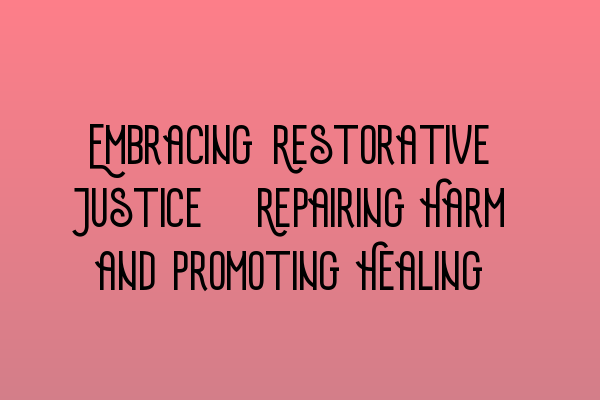Embracing Restorative Justice: Repairing Harm and Promoting Healing
At SQE Criminal Law & Practice Law UK, we believe in the power of restorative justice to transform the criminal justice system and promote healing for all parties involved. Restorative justice is a paradigm shift from the traditional punitive approach, focusing on repairing harm, reintegrating offenders, and empowering victims.
Understanding Restorative Justice
Restorative justice is a process that brings together the victim, offender, and community members in a facilitated dialogue. Its primary goal is to address the harm caused by the crime and find ways to repair it. This approach recognizes the importance of victims’ rights and gives them an active voice in the resolution process.
Through open and honest communication, restorative justice allows victims to express their feelings, ask questions, and receive answers directly from the offender. This fosters understanding, empathy, and ultimately, the possibility of forgiveness. Offenders, on the other hand, are encouraged to take responsibility for their actions, understand the impact on the victim, and make amends.
The Benefits of Restorative Justice
Restorative justice offers numerous benefits to all parties involved. For victims, it provides an opportunity to be heard, acknowledged, and participate in decision-making. It empowers them to find closure, heal emotional wounds, and regain a sense of control over their lives.
As for offenders, restorative justice offers a chance for rehabilitation, reintegrating them into the community while holding them accountable for their actions. Through meaningful dialogue, offenders gain awareness of the consequences of their behavior, develop empathy, and strive to make positive changes in their lives.
The community as a whole also benefits from restorative justice. It promotes a sense of shared responsibility, encourages the development of empathy and understanding, and seeks to prevent future crimes. By addressing the root causes of criminal behavior, restorative justice contributes to building safer and more cohesive communities.
Implementing Restorative Justice in the UK Criminal Justice System
While restorative justice has gained recognition globally, its implementation in the UK criminal justice system is still evolving. However, there are already successful initiatives and pilot programs that showcase the potential of this approach.
One example is the use of restorative justice in cases of low-level offenses, such as minor assaults or property crimes. These cases, when appropriate, can be diverted from the traditional court process and instead resolved through a restorative justice conference. This not only saves time and resources but also provides a more meaningful and effective resolution for all parties involved.
Another promising avenue is the integration of restorative justice into the sentencing process. Judges can consider restorative justice options when determining appropriate punishments, taking into account the desires of the victim and the potential for rehabilitation of the offender.
Furthermore, restorative justice is being increasingly used in cases involving young offenders. Recognizing the importance of early intervention and rehabilitation, restorative justice programs aim to break the cycle of reoffending and give young people the opportunity to make amends and learn from their mistakes.
Getting Involved in Restorative Justice
If you are passionate about restorative justice and want to explore its potential further, there are various ways to get involved. SQE Criminal Law & Practice Law UK offers workshops and seminars on criminal practice, including sessions on restorative justice. These sessions provide an in-depth understanding of the principles and practices of restorative justice, equipping you with the knowledge and skills to advocate for this approach.
Additionally, staying informed and prepared is crucial in the ever-changing landscape of UK criminal laws. Check out our article on Updates in UK Criminal Laws: Staying Informed and Prepared to learn more about the latest developments that may impact restorative justice.
You can also enhance your SQE criminal law study group experience by delving into a detailed analysis of criminal evidence rules. Our article on Decoding Criminal Evidence Rules: A Detailed Analysis provides valuable insights into this topic.
For those interested in exploring specific areas of criminal law, our article on Deep Dive into Fraud and Financial Crimes in the UK is a comprehensive resource that covers the intricacies of this field.
Finally, collaboration and sharing knowledge are essential in promoting restorative justice. Consider expanding your expertise by joining a study group or participating in workshops and seminars. Our article on Enhancing Your SQE Criminal Law Study Group Experience offers useful tips on how to make the most of these opportunities.
Conclusion
Restorative justice has the power to repair harm, promote healing, and transform the criminal justice system. By embracing this approach, we can create a more compassionate, inclusive, and effective system that puts victims’ voices at the forefront and aims for the rehabilitation and reintegration of offenders.
At SQE Criminal Law & Practice Law UK, we are committed to promoting restorative justice and providing resources to expand your expertise. Join us in embracing this transformative approach and be part of the movement towards a more just and compassionate society.
